|
When I'm going through a difficult time and someone asks how I am, I find myself saying that "I'm riding the waves as best I can." And it's true. I'm not lying and saying that I'm "fine" when I'm not, and I'm not committing to explaining all the reasons why I'm not excellent. I'm "riding the waves" as best I can, and that makes me feel really proud. Grief is wave-like in nature. There are times when you move towards it and times you move away. Staying with the wave-like analogy, there are times when the sea of your life is stormy and other times when the sea is calm. Jon Kabat Zin says, "you can't stop the waves, but you can learn to surf." So, I suppose, this post is about surfing...how do you learn to ride the waves? 1. Recognize that grief is dynamic. It changes and it has rhythms. Being mindful of your grief reveals a natural rhythm - an ebb and flow. There will be periods of intensity followed by periods of reprieve - where everything is in a constant state of motion...a fluidity. This natural rhythm is how you dose yourself with pain - sinking into the intensity at times and at other times moving way from it and resting. Tuning into this rhythm and honouring it is powerful self care. 2. Identify Impermanence - By understanding and experiencing that all emotions have movement and come to pass, we build trust in our ability to be adaptive in the face of emotional suffering. One of the most powerful and supportive mantra's I have found for myself is "This too shall pass," which is reflected in this thought provoking quote by Neil Jordan: "I hoped that grief was similar to the other emotions. That it would end, the way happiness did. Or laughter." 3. Try not to silence any aspect of your experience. It's easy to be swept up in the "positive vibes only" culture, but with grief, acknowledging the pain will help you "ride the wave" instead of trying to out-swim it. (Refer back to #2 - understanding the impermanence of emotion gives you the strength to tread water, versus exhausting yourself trying to out-swim a wave) 4. Intentionally gather your "tools" that help you cope with the waves of grief. As you live with loss you will learn more about what you need, and when you need it. Be intentional about noticing who and what feels supportive, and what you need to cope. Riding the waves of grief takes practice. I've never actually tried surfing, but I hear it's extremely hard to do and difficult to learn. I've heard it takes a LOT of practice. Even when you can do it (to whatever degree that is!) you are still at the mercy of the wave. Even the most accomplished surfers in the world, still need to practice. (Practice (verb), repeat action to improve: hone, study, discipline, habituate, iterate, polish, do again, become...) The tools of yoga and meditation are also "practices." We don't become experts and then never do them again. We practice them repeatedly, so that our skills are adaptable, flexible, and second-nature when we need them. If we can practice tending to our physical, emotional and mental needs in the relatively safe space of our yoga mat, we will be more prepared when life happens off the mat. It's an act of kindness to yourself. Stay steady with the practice. See you on the waves, Sandy
0 Comments
A memory washed over me today. I remembered a family gathering a few years ago. One of my cousins slid in beside me where I was sitting on the steps of a deck. She was sobbing. "What's happening for you right now?" I asked, a bit surprised by her sudden emotion.
"I just looked over at everyone together and I thought, 'Dad should be here,'" she said. "He should be here and he isn't." Her Dad had died 10 years previous. In our society we tend to focus on the TIME that has passed since someone died, instead of the experiences that have passed. Time is irrelevant when it comes to matters of the heart. It doesn't matter how long it has been. What matters is what your heart has or hasn't had to encounter and feel. There was something in that moment with my cousin - a specific mixture of memory and circumstance that made her miss her Dad. Maybe it was the summer breeze, maybe it was the people who were there, or the reminiscing of old times that was happening. Whatever it was, that moment made her encounter her loss in a new and unexpected way. I remember my Dad at that same family gathering alive and sort-of well. I remember seeing him socializing and laughing with his oxygen tank in a backpack on his back. My Dad died in November 2019. I missed our big family Christmas party that year, and then Covid hit. I'm anticipating the next family gathering will bring up raw and new grief because I haven't had to navigate that familiar group of people without him yet. The isolation and physical/social distancing that we've all been facing due to Covid has insulated us against many of the social encounters and functions that would normally and understandably cause a natural wave of grief. We've become "out of practice" of encountering grief in this way. It's not only large family parties. It's little things. It's Sunday family dinners. Going to our family cabin and spending a weekend there. Favorite restaurants, and enjoyed activities. It's seeing my parent's friend group together, and my mom on her own. It's even more that I'm not expecting to be sure. What is it for you? What hasn't happened yet that you anticipate will be hard? Here are a few tips for navigating re-opening while grieving...
First of all, it's important to know all the ways grief affects you... Then, we can look at all the ways yoga is supportive...and there are many... How has it helped you? Let me know in the comments below.
"Do not be daunted by the enormity of the world's grief. The events in our world right now (climate change and losses due to fires and floods, the Covid pandemic and the uprising against discrimination and oppression) have brought grief, loss and trauma to the forefront of our collective experience, albeit in different ways. I feel like we are all the care-givers of a grieving world. And it is SO HEAVY. With all this going on, I’ve been wondering: How can I care for the people who need it? How will we cope with ALL of this? What can I do? I feel frantic to do something - get on zoom, get on Facebook or Instagram live, plan something to help...on and on and on...and simultaneously I think, "I don't know what to do." This tension between the two states is what this post is about. The quote that I opened this newsletter with has been a guiding one for me: "Do not be daunted by the enormity of the world's grief. Do justly now, love mercy now, walk humbly now. You are not obligated to complete the work, but neither are you free to abandon it.” I will not abandon the work that needs to be done in the realm of grief support. And yet, another guiding mantra I have is,“You are helpful in your helplessness.” At first glance, it can seem impossible to balance these two things: Helplessness, but not abandoning the grief I witness. I believe, however, that these two states are not incompatible with each other. Rather, there is a creative tension between them. They need each other. Especially now. In this context, being helpless doesn’t mean doing nothing. It means understanding that there is nothing that you can do to fix or take away someone’s pain. Recognizing helplessness creates connection and support because the griever is less alone when there is someone else willing to sit in the darkness with them. This, actually, is really hard for us helpers. Sometimes, the more we explore someone’s pain with them, the harder it is to remain "helpless." I see this in myself at times in my personal and professional life, when I’m witnessing someone else's grief or uncertainty. I want to jump in to make it all better. I want to take away the pain. I want to spew solutions, and tell them “everything is going to be OK.” {In moments like this, when you notice yourself placating, as yourself, "What am I trying to make more comfortable?" So often it's OUR OWN discomfort we are trying to appease, not the person we are supporting.} Although this protective reaction is well meaning, it's not helpful. I have to mentally stop myself. I remind myself that there is absolutely nothing that I can say that will take the person’s pain away. Simply listening, and upholding the experience of the other person is the most genuine, compassionate and helpful response. Listen to their story, listen to their hurt. Listen to their fears. Don't try to change it for them. Stay humble. Henri Nouwen captures this so vividly in this quote: “Healing means, first of all, the creation of an empty but friendly space where those who suffer can tell their story to someone who can listen with real attention. As healers we have to receive the story of our fellow human beings with a compassionate heart, a heart that does not judge or condemn but recognizes how the stranger’s story connects with our own. We have to offer safe boundaries within which the often painful past can be revealed and the search for a new life can find a start. Our most important question as healers is not, what to say or to do? But, how to develop enough inner space where the story can be received? Healing is the humble but also very demanding task of creating and offering a friendly empty space where strangers can reflect on their pain and suffering without fear, and find the confidence that makes them look for new ways right in the center of their confusion.” As a grief care-giver, you create the conditions for the griever to find their own way through their pain. This is how, as the quote says, "you are not obligated to complete the work." Everyone has to integrate their own loss themselves... Still, we cannot abandon grief, grievers, or ourselves. In our society, how we deal with grief is a social justice issues. Perhaps it is more accurate to say how we don’t deal with grief is a social justice issue. We must commit to contributing to social change and justice for the grieving and the bereaved. We must remain open to witness and receive the discomfort within ourselves, and in our societies. We must do the personal work we need to be able to be in genuine connection and compassionate presence with others. We cannot abandon grief. If we can support grief we can empower grievers, and with empowerment, people can integrate their losses in meaningful ways. We can be helpful in our helplessness. “As we practice alone, but together, we explore potent practices that open the heart and mind to insight, intimacy, and interconnection with all life.”
I recently posted the quote above in a Yoga for Grief Support Participant Group,
followed by this: How are you all doing this week? What have your practices looked like, and what insights have you had? Once it was posted, I felt a bit sheepish...because I have to admit that I haven’t been on my yoga mat once. So, then I left the following comment: "I haven’t been doing ANY yoga. I think about doing it a lot but haven’t got down on the floor to do anything formal. I’ve been stretching in the shower and taking deep breaths before I fall asleep. Lots of reasons for this: my brain is DONE at the end of the day being one reason, and the second is we have a puppy at home and he is ALL OVER me if I am on the floor (or the couch, or anywhere really)! Oh well- yoga will be there when it feels more possible.” I was trying to communicate that sometimes yoga takes a back seat to other things, and that is OK. And it is, but... I’ve realized that this rhetoric is a really narrow way of viewing yoga and it’s place in my life. Let me explain: A few weeks ago, I was messaging with a friend of mine who practices yoga and mindfulness. We were talking about people who were choosing to not physically distance during the Covid pandemic and wondering why they weren’t, when the risk of spread was so high. “Is it our yoga that keeps us somewhat mindful?” my friend asked. “I totally think that yoga and mindfulness makes people comfortable with discomfort," I replied, "I also think those practices keep us grounded and allow us to understand interconnectedness and unity." The restrictions that are placed on us right now, have the potential to make us more “itchy.” We are itching for our favorite restaurant food. Itching to get campsites booked and summer plans made. Itching to have a patio beer with our friends. Itching for all this Covid stuff to be DONE. “Everyone wants to scratch the itch," she said. “Learning to recognize the itch and not scratch it is exactly it,” I said. “It’s all just mind- stuff – craving, desire, habits – becoming aware of these and disengaging from their power over us is what mindfulness and meditation are trying to teach."
*Mindfulness is an umbrella term for both formal practices (meditation and yoga are examples) and
informal practices (mindful awareness as you move through your day). Mindfulness is an intentional quality of attention. You pay attention, on purpose, simply for the sake of non-judgmental noticing. You notice the habits of the mind - the monkey mind, the habits, the cravings - but you create a gap between their stimulus and your response. Mindfulness slows everything down so it can be captured in awareness, and then asks, "What is the next right thing?"
Therefore, I must correct myself. I haven’t been doing yoga asana (the postures), but I’ve been very yogic and mindful in how I am living.
Most people think only of the physical poses when they think of yoga. In reality however, the poses (or asanas) are only a small part of a yoga practice. The Yoga Sutras of Patanjali refer to 8 limbs (or parts) of a yoga practice. You can read more about them here, but in this post I’ll give you examples about being yogic in Covid times.
Limbs 1 and 2 - the Yamas and Niyamas:
The first two limbs are about ethical and moral principles. The Yamas reflect how you are in the world and include non-harming, truthfulness, non-stealing, non-hoarding and how we use and direct our energy. Covid living requires sensitivity towards public health ethics, and makes us critically look at how our actions affect others in the world. I’m aware of, and understand how my actions may hurt other people, and I am choosing to live in a way that significantly limits harm. more vulnerable people. I am self-isolating, washing my hands, wearing a mask in public places. I'm truthful and honest with myself and others about my exposure risks, which is required in my vocation as I work in a hospital with vulnerable patients (immuno-compromised and end of life). I don’t steal personal protective equipment from work as I know that front line workers need it and there are limited quantities. I have yet to hoard toilet paper. I’m no longer just thinking about getting groceries – I’m thinking of how we are all connected – I’m thinking of the people who are picking the fruit, transporting it, stocking the shelves, scanning the items through check out. I am aware of how we are mutually responsible to each other. I’ve spent a lot of time reflecting on how to use my energy wisely and have come to the conclusion that I can only do what I can do, and I've stopped fretting about what others are doing. This ethical and moral action in the world does not preclude the oath that I have to myself. The second limb, the Niyamas encompass individual observances to remain healthy and well. It includes: taking care of my body (using my neti pot, hand hygiene, rest, hydration), contentment (ie. not waiting for the storm to pass, but learning to dance in the rain), discipline (creating a routine and structure to my day), self-study and self-reflection (I’ve been reading, journaling, analyzing my dreams) and spiritual practices. All of this has made me aware of my cravings and my habits. Slowing down has made me look more clearly at the choices I am making in all aspects of my life. I am more mindful by necessity, which by the way, is exhausting because I’m no longer living on autopilot and habit. Limb 3, 4 and 5 - Asana, Pranayama, and Pratyahara: The next 3 limbs encompass the yoga postures, breath work and turning your attention inward. I've already established that I haven't been consistent at all with doing the physical postures of yoga, but I have been moving my body on a regular basis. I’ve been breathing deeply before bed as I fall asleep. I’m aware of my inner state – my fatigue, my energy levels and my bandwidth. At work, I’m required to report to complete a health symptom screen which forces me to pay attention to my body. The yogic art of this is knowing where the line is between awareness/assessment versus obsession/panic (some days it's a moving target), which brings me to the last few limbs of yoga... The 6th Limb - Dharana: Concentration: focusing the mind on ONE thing, not everything. The potential for distraction into a slough of bad news is high right now. Mindfulness meditation and yoga have taught me that my mind, by it's very nature, tends towards distraction, problem solving, organizing and planning. Living in the reality of Covid reveals that we simply DO NOT KNOW the duration, path or outcome out of this. The mind does not like this uncertainty, and therefore tries even harder to figure it all out. I'm aware of this. I'm also aware of the power and choice that I have to disengage from the merry-go-round of thinking that is so easy to spiral into. Basically, I try to think about one thing, not everything. I’m not multi-thinking, or multi-tasking and it's been quite lovely. The 7th and 8th Limb - Dhyana and Samadhi: These two limbs, meditative absorption (Dhyana) and bliss (Samadhi), arise spontaneously as a result of all of the other elements of yoga combined. These limbs do not describe an escape to bliss, rather, realizing peace in your life, exactly as it is, without disturbance of your thoughts, judgments, habits, distractions, or distorted perceptions. The literal meaning of the word yoga comes from the Sanskrit root word yuj, which means to join or unite. Covid has made me consider union on a broader scale, including all humans around the world but also extending beyond to plants, animals and the earth. We have all seen how our past actions have negatively affected the planet, and in recent weeks, how our current actions have created the space for the earth to regenerate and heal. Having looked at Covid under the philosophy and framework of yoga, we can circle back to the quote that started this post, and read it again: “As we practice alone, but together, we explore potent practices that open the heart and mind to insight, intimacy, and interconnection with all life.” ―Mark Karly Coleman For me, it takes on a whole new meaning. As it turns out, I've been practicing yoga this whole time <3 The literal meaning of the word yoga comes from the Sanskrit root word yuj, which means to join or unite. Practically, however, yoga is a method of discipline, technique, philosophy, and ethical conduct, with the aim being to completely know yourself and be at peace with yourself. Most people think only of the physical poses when they think of yoga. In reality however, the poses (or asanas) are only a small part of a yoga practice. The Yoga Sutras of Patanjali refer to 8 limbs (or parts) of a yoga practice. I’ve outlined them below*: *Although I have listed the 8 limbs as separate, they are all interconnected and interwoven with each other. Yoga is a holistic practice that taps into multiple facets of mind and body, and has several cumulative effects. This synergy is difficult to capture with words. Nevertheless, I’ve broken down the 8 limbs of yoga below, to assist with your understanding of a holistic yoga practice, beyond just the poses…*
Interestingly, the purpose of yoga is the cessation of churning thoughts in the mind. Combined, these 8 limbs settle a fragmented, vacillating and distracted mind into a single point of focus. A calm and focused mind is one that can connect (unite) with the body. This focused attention and connection creates the freedom to live inwardly and outwardly in an aware and peaceful way. This is yoga. Yoga for Grief Support: Yoga is not a fix for your pain, rather it’s a support that tends to the body and the mind. It activates your own inner resources to create the conditions you need to heal. In congruence with the word yoga meaning to unite, after loss yoga helps to “unite” all the parts of yourself that feel broken and dismembered; so that you are re-membering in a way that integrates the loss into your life, so you can eventually live well again. Yoga encourages you to be an active participant in your own healing. It’s a tangible practice that you can do by yourself and for yourself. Often, the effects of a practice can be felt the first time your try it, which is encouraging, and makes it more likely you will do it again. Yoga is a process. We call it a “yoga practice” because each time you get on your yoga mat it can feel different and we practice ‘showing up’ with compassionate curiosity, tending to each moment, each sensation and each emotion as it arises. My only "rule" in exploring your mind and body through yoga is to be gentle and kind with yourself. “Words fail to convey the total value of yoga. It has to be experienced.” – B.K.S. Iyengar
Michael Meade (who hosts a wonderful podcast called Mosaic Voices that talks about soulful mythology in our present day) describes the New Year as a rite of passage; a ritual to end the old year, and celebrate the start of a new period. A time of renewal, of beginnings. A threshold time. A liminal space; 2019 is gone, 2020 is yet to come.
Grief is also a threshold time. Grief plunks you in liminal space - betwixt and between two lives that don’t seem to fit; you live suspended between a past for which you long and a future for which you hope, to quote Gerald Sittser, from his book A Grace Disguised. Living in liminal space is hard. It’s uncomfortable. It’s unknowable. In a society that has an abundance of drive to DO things, and become "better" (what does that even mean?), existing in a threshold time can feel like you are doing it "wrong." You aren't. This is precisely what grief calls us to do - slow down, and pause. Give yourself the time to be in emotional and spiritual intensive care. It’s in this threshold space that you figure out how to live your changed life, and that takes time, it takes living, and it's really, really hard. This is how loss and grief become an integrated part of your whole. If you’ve been living moment to moment, or hour to hour to get through the early months after a loss, extending your mind into the future (planning a resolution at New Year’s) can be especially daunting and lonesome. Opens up a new abyss of grief and longing for things to be different. And yet, they aren’t. I remember talking to a dear friend about this - how as time went on, and we started living day to day, then week to week, then month to month, it was harder in different ways. As such, the custom to make a New Year’s resolution can be wrought with anxiety, especially when life has changed so much already. If this resonates with your experience, here are some things to consider:
The Wound of Love by Maya Luna Today I gave up On healing my trauma I gave up On practicing the skills To become whole Today I gave up On evolving Into that ever elusive Better version of myself Today I submitted To the wound of love I stopped pointing at it Looking at it Soothing it Tweaking it Fixing it Finessing it Hiding it Polishing it I stopped this game of separation I crawled inside the wound And spread it open I decided to wear it like a gown I accepted my total and utter Failure To be anything else But me
Blessings to you all.
You're perfect just the way you are... I know it may not feel like it, but know your heart is still shining like the sun. Namaste, Sandy *This post was written the month after the death of my Dad* When a loss happens, it's natural to want to solve it right away. To do something, anything to make it better. But staring a grief support group too early can be counter productive. These early days of grief remind me of something important. Early on, there is a tendency to move away from the reality of the loss. This is a protective response of the heart. I see this in myself. Instead of using yoga as a way to process what I'm feeling, I've been using it as a distraction. I want my practice to be sweaty and muscley and fast...not a lot of time to think or feel. This is what I need right now. It would be counter productive to the needs of my heart and spirit to force exploring emotions that I'm not ready to feel. As time passes (and there is no set timeline), and numbness wears off, you will naturally move towards the pain and realities of the loss. It's often as the numbness fades and the realities of living with loss set in, that more support is needed. It is then, that a class like Yoga for Grief Support may be helpful. In the Yoga for Grief Support program, we use yoga and meditation as a way to "go inside" and explore the pain and reality of the loss. One has to be "ready" to do this. Starting too early may feel like you are driving with one foot on the gas and one foot on the brake. In most cases (not all), it may take a number of weeks to a few months to be ready for a class like Yoga for Grief Support. Each circumstance is different, with a number of factors affecting someone's readiness. Sometimes, people start a group and realize it's too soon. That's OK too - it's impossible to know what this grief experience is like because each loss is so different. If you want to explore this further with me, feel free to reach out via email. I find the poem below, by Wendell Berry to be helpful when considering if you need specific grief support. Sometimes, it is when you don't know what to do, that you are ready to start. It may be that when we no longer know what to do November was a rough month in my world. On November 14th, after a two year illness, my Dad died. He had pulmonary fibrosis. Over the past two years, I have been mentally drafting a blog post called: When It Happens Again. IT being death and emotional trauma. I remember feeling such protest as I was considering the fact that IT could (would) happen again. A deep revolt and fear around knowing what grief is like, and not wanting to go down that path again. This mental blog post I had drafted was going to be a piece around how I would cope with grief the next time 'round, based on everything I had experience and learnt since the first time 'round. Things like:
I never did write that post. I kind of wish that I had - then I could refer back to it as a little pep talk for myself. Now that IT has happened, all the best laid plans I had mentally made, have dissolved into the cocoon of shock. I'm steeped with numbness and shock that has dulled the realities of my outer and inner world. My mind isn't working as quickly. I'm forgetful. I start 16 different tasks in a day and don't complete any of them. I didn't brush my hair or my teeth today and I have nothing to show for how busy I felt. I don't feel the protest the way I thought I would. That must have burned itself out during my dad's illness as I watched him slowly (and then quickly) decline. My anxiety is gone. I was paralyzed before his death about what was going to happen. Now it's happened and I've been relieved of that worry. That lack feels numb too. And yet, the world says speed up when everything within my body and mind says slow down. I feel this tug of war in my gut and my chest and I dread having to navigate it; It takes so much extra energy. I know the numbness and shock serves a purpose. The heart can't feel the full reality of the loss at once. It is not worth forcing myself out of this cocooned place. My wise body/mind/spirit will naturally dose itself with the pain and the reality of the loss, in it's own time. My conscious mind may not be privy to this timeline. So, what do I do? I start right where I am. I rest. I cocoon. Be gentle with myself. I've noticed more intrusive thoughts in the past few days around the circumstances of his death. This too, I know is normal. Instinctual even. There is a natural tendency to go over it all, again and again. Cognitively trying to make sense of it. While *the world* wants me to get on with living, and get back to life, I know that pausing, even going backwards into the past is important grief work. It makes the unreal real, and is an important part of processing the reality of the death. I've found myself gently approaching the pain and reality a couple of nights ago. I drove by the hospital and looked up to the window that was his room. It made my chest ache. I want to live-backwards. I want to spend some time reviewing what-the-hell-just-happened. I'll probably write it out. Get those thoughts out of my head and onto paper. I may even walk from where I would park my car, to the unit he was on, just to remember and feel it when I'm ready to. But, who knows! Grief is unpredictable, and living-in-the-moment for me at this time means responding to whatever need arises, when it does. It's all vital work. Grief work. Mourning work. I do know that this time 'round I am part of (and can rely on) a community of people who "get it" to support me and I feel all those people in my cocoon with me.
This time 'round, I'm more open to receiving care and being cared for. That feels really nice. Thank you. To those near and far, known to me and unknown. The grief warriors that live this every day. We are not alone. Sandy It's October, the month of Canadian Thanksgiving, and messages of gratitude are inescapable. I came across an article online that was titled "Go From Grumpy to Grateful in 5 seconds!!" It irritated me. I'm irritated by the simplicity and instantaneous of it. Especially in October, when the bereaved are staring Thanksgiving in the face, wondering about how to navigate this "holiday" of gratitude, togetherness and abundance, when life has been irrevocably changed by something as uncontrollable and in-suppressible as death and grief. Grumpy to grateful in 5 seconds The premise is that changing your language from "I have to" to "I get to" creates more gratitude. For example, changing the statement "I have to go to work today," to "I get to go to work today" does make me feel more grateful for the fact that I have a job I love. I do find that it shifts my perspective in a positive way, and I'm not denying that this could be beneficial. But, with grief, I'm not so sure it's a helpful strategy. Especially in the early days and months after a loss. I think back to the first Thanksgiving after Cam died. I could have said, "I get to go to our family dinner," but the only person I was looking for in that crowded room was him. I could have said, "I got to have him in my life" instead of "I have to live without him," but NO...at that time, the amount of instinctual protest I felt over his death screamed without end "I HAVE TO LIVE WITHOUT HIM IN MY LIFE." Gratefulness felt trite, empty and impossible. In the past, wrote a blog post about this experience, and outlined some ways to make gratitude more accessible while grieving (you can read it here)...but this week, I was reminded by a grieving friend that sometimes, gratitude just isn't there. Period. It got me thinking... This divisive mindset of grumpy or grateful, or sad or happy, sorrow or joy, isn't helpful. It doesn't capture the complexity of human emotion, nor does it promote understanding the parts of ourselves that are so obviously calling out for attention and compassion. What is wrong with feeling grumpy instead of grateful? I think it's an appropriate way to feel if someone you love has just died, and Thanksgiving is approaching. Just because it's October, doesn't mean your grief vanishes and is replaced by gratitude in 5 seconds! If you find yourself unable to feel grateful this Thanksgiving, try releasing the struggle to feel something you don't feel. Don't engage in a discordant battle with yourself. What if you gave yourself permission to just feel what you feel? Invite the sorrow to sit beside you at the table, so it doesn't have to struggle or compete for your attention. When there is no battle inside, you can listen to yourself and your needs with more clarity. What do you really need to feel more peace/balance/support/recognized/acknowledged/heard etcetera? The integration of grief requires authentic expression of your experience. Especially the hard stuff. And, it also requires safe people and places for you to explore your grief and changed self. May your Thanksgiving plans include some of these people and places.... With time, no timeline, and from a place of true integration of your loss(es) and grief, gratefulness may spontaneously arise. And, because you'll have been practiced at paying attention to all aspects of life (the beauty and the pain), it's presence and your awareness of it will be even deeper. I'd love to know your thoughts on this: What is Thanksgiving like for you this year? And, what has gratitude/gratefulness been like in your experience of loss? Wishing you moments of peace this weekend. Namaste, Sandy |
AuthorSandy Ayre Categories
All
Archives
December 2022
|
Classes
|
Helpful Info
|
|



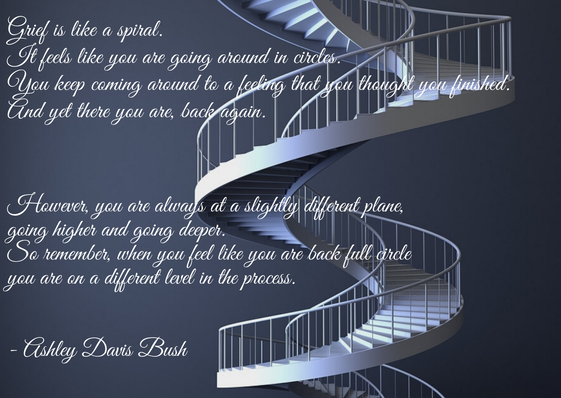

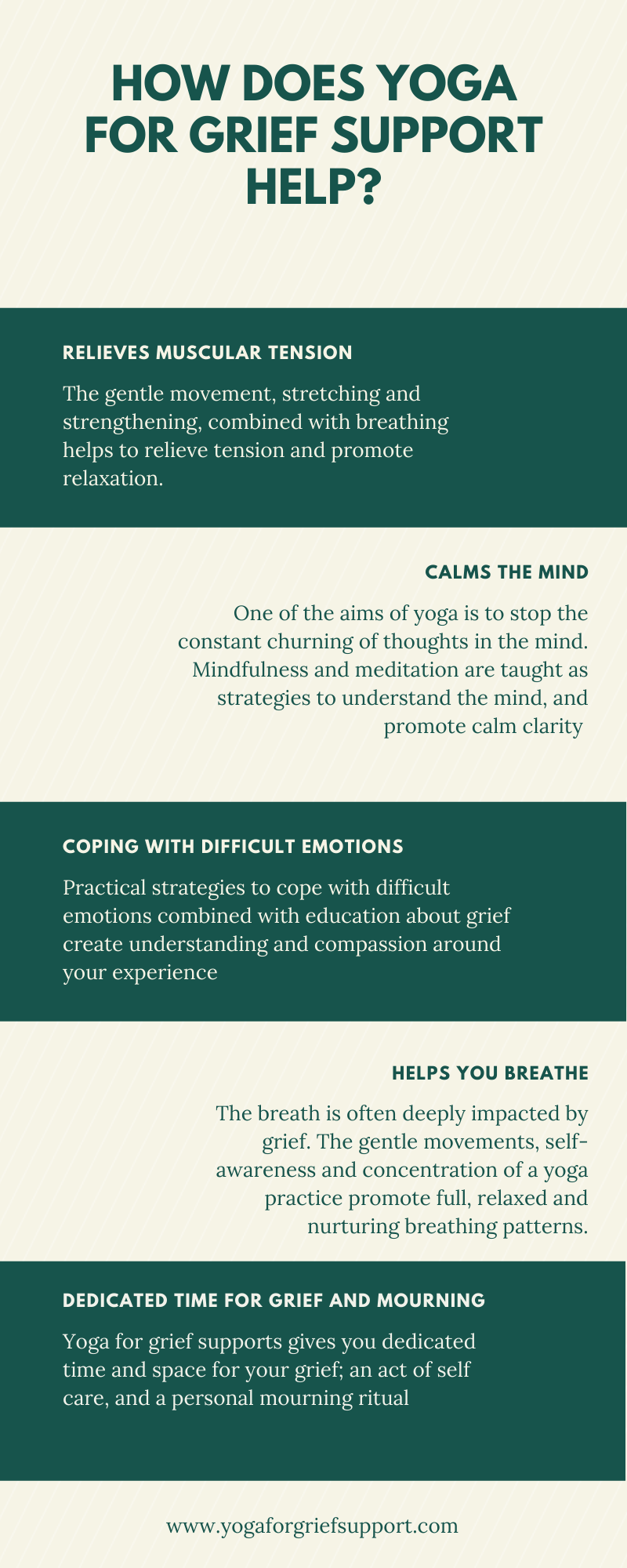


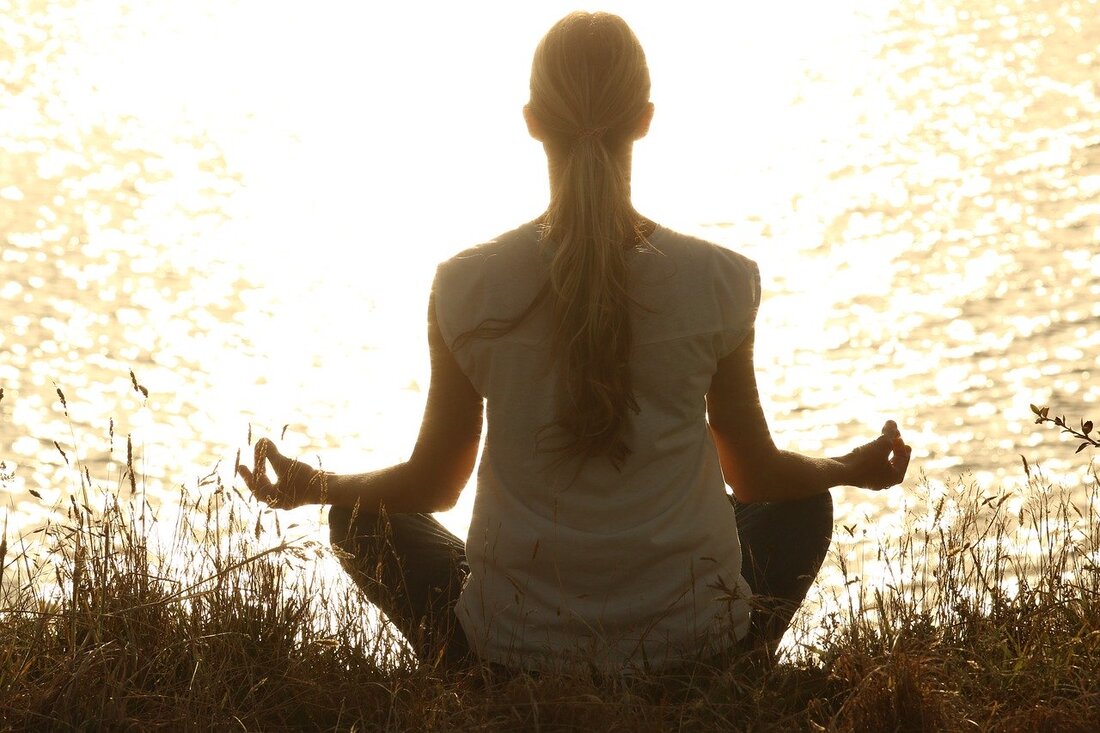
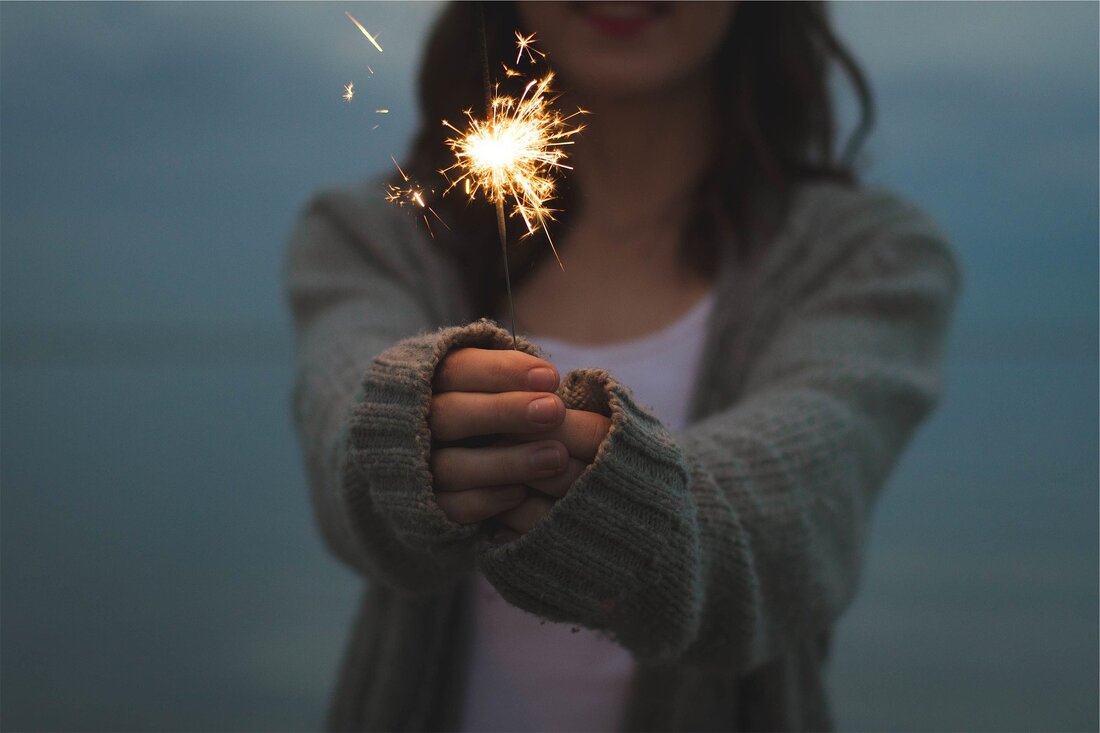
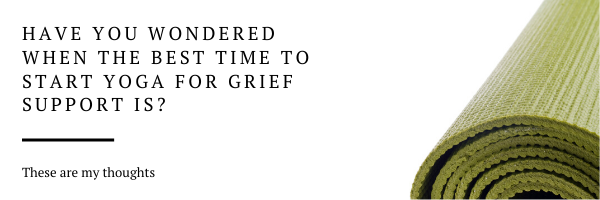
 RSS Feed
RSS Feed
